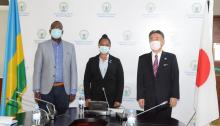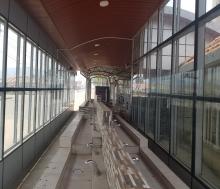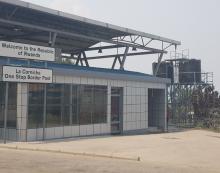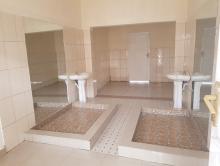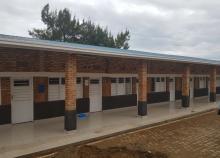WHO hands over Emergencies facilities under the Japanese grant of US$ 1 million
The Rwanda Ministry of Health officially received on 26th November 2020, equipment and infrastructure constructed and rehabilitated with WHO Rwanda support under the Japanese grant of US$ 1 million for Ebola Virus Disease (EVD) and other public health emergencies. Present at the Handover ceremony were Dr Daniel Ngamije, the Minister of Health, HE. Masahiro IMAI, the Ambassador of Japan in Rwanda and Dr Kasonde Mwinga, WHO Representative, Rwanda Country Office.
The infrastructure received include Isolation Facilities, WASH infrastructures, and Thermal Imaging Camera Shelters funded by the Government of Japan through the project entitled “Strengthening Preparedness for Ebola Virus Disease and other Priority Public Health Emergencies in Rwanda”.
Dr Daniel NGAMIJE, Minister of Health, thanked the very useful support provided and highlighted how vital the support of partners has been in these crucial times: " The construction of the shelters enhanced functionality of the thermal imaging cameras. This will make the screening of travelers easier especially at this point in time when Rwanda is reopening land borders. The handwashing facilities will enhance infection prevention and control among travelers."
Shelters for thermal imaging cameras were installed at 6 points of entry (POEs) in 4 districts: “Poids Lourds” and “La” Corniche points of entry in Rubavu District, Rusizi I and Rusizi II in Rusizi Districts, Cyanika in Burera District, and Rusumo in Kirehe District. These points of entry were selected based on their highest priority and the fact that they are the busiest points of entry.
Isolation units were renovated in 3 hospitals: Gihundwe District Hospital in Rusizi District, Bushenge Provincial Hospital in Nyamasheke District, and Nemba District Hospital in Gakenke District. All isolation units respected infection, prevention, and control principles with a clear distinction between Red and Green Zones.
HE. Amb. Masahiro IMAI said: “Japan appreciates the great ownership and the robust measures taken against COVID-19 by the Government of Rwanda.” He continued with how prepared Rwanda has been even through a Global crisis. “Although the World is facing a major Public Health crisis, Rwanda has handled the situation with limited resource and still managed to come up with best practices. It is only fair to salute and support the efforts.”
Dr Kasonde MWINGA, WHO Representative, thanked the Government of Japan and other partners for their commitment to better prepare and respond to Public Health Emergencies: "One of Rwanda's best practices reported is that COVID-19 preparedness and response efforts built on the EVD readiness national capacities. The project results that contributed to this include the reason we are here today. WHO remains committed to continuing working with the Government and Partners in stemming the spread, as well as preventive measures with the anticipated COVID-19 roll-out. We continue to celebrate this while remaining vigilant to strengthen health systems to prepare and respond to any future threats.'
Rwanda has been at risk of the importation of EVD ever since the Ministry of Health of the DRC declared a new outbreak. Due to the proximity of the DRC outbreak to the border with Rwanda, the Rwanda Ministry of Health, together with partners, engaged in preparedness and response activities aimed at improving infection prevention and control (IPC) and Case Management (CM) in priority Districts. WHO with financial support from the Government of Japan and other partners supported the implementation of interventions to strengthen epidemic preparedness and response to EVD and other public health threats including COVID-19 with a focus on building comprehensive national preparedness capabilities for public health emergencies.



